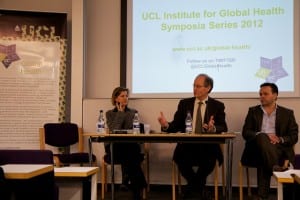Having it all – dispelling the myths about work and motherhood
By news editor, on 12 March 2012
Thursday 8 March saw worldwide celebrations for International Women’s Day, one of which was held at Stanmore College. The College linked into a live stream of the UCL lunch hour lecture titled ‘Having it all – dispelling the myths about work and motherhood’ which was delivered by Dr Anne McMunn (UCL Department of Epidemiology & Public Health).
Dr McMunn presented fascinating data which indicated that there are significant behavioral differences between daughters of mothers who work and those who stay at home; the behavior of those whose mothers go out to work being more positive. Interestingly, the significance was not as high with regard to sons. Data was also provided to show that the BMI (body mass index) for mothers who work tends to be healthier than for those who remain at home.
Watch the full lunch hour lecture below
 Close
Close


